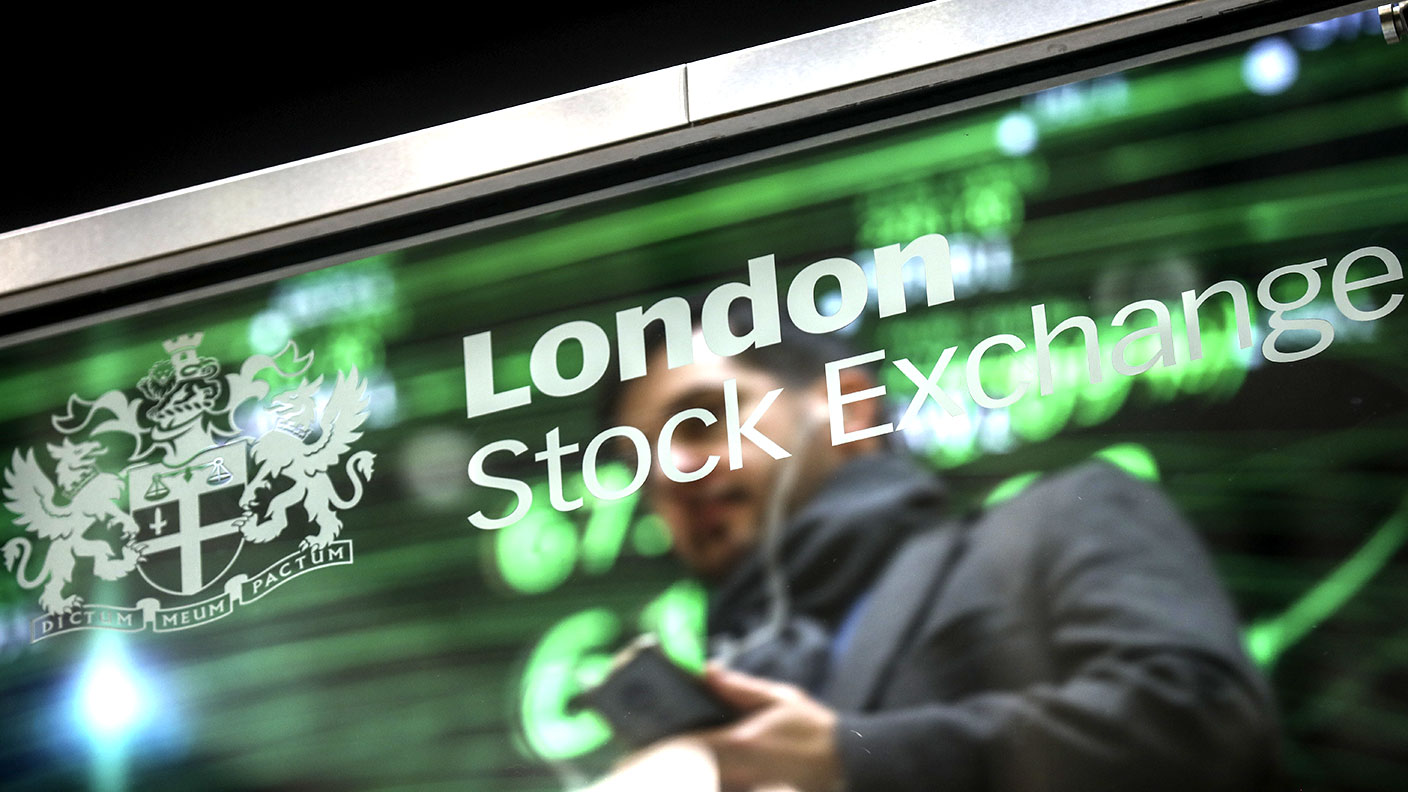Take charge of your money – find out which funds platform is best for you
More and more people are investing for themselves. But which broker should you use? Holly Mackay explains what you need to know.
Get the latest financial news, insights and expert analysis from our award-winning MoneyWeek team, to help you understand what really matters when it comes to your finances.
You are now subscribed
Your newsletter sign-up was successful
Want to add more newsletters?

Twice daily
MoneyWeek
Get the latest financial news, insights and expert analysis from our award-winning MoneyWeek team, to help you understand what really matters when it comes to your finances.

Four times a week
Look After My Bills
Sign up to our free money-saving newsletter, filled with the latest news and expert advice to help you find the best tips and deals for managing your bills. Start saving today!
More and more people are investing for themselves. But which broker should you use? Here's what you need to know, says Holly Mackay.
The introduction of the Retail Distribution Review (RDR) in January banned commissions, made charges more transparent and forced more honest conversations between financial services providers and their customers.
As it becomes clearer just how much financial advice costs, more and more investors are taking charge of their own money. If you plan to join them, you'll need a platform' a broker or fund supermarket to buy and sell your funds (or shares) through.
MoneyWeek
Subscribe to MoneyWeek today and get your first six magazine issues absolutely FREE

Sign up to Money Morning
Don't miss the latest investment and personal finances news, market analysis, plus money-saving tips with our free twice-daily newsletter
Don't miss the latest investment and personal finances news, market analysis, plus money-saving tips with our free twice-daily newsletter
Platforms have become even more relevant after this year's pensions reforms, which are likely to take more retirees down the drawdown path, rather than the automatic annuity selection of old.
But with so many funds platforms out there (and more joining the fray all the time), how do you pick the right one? I've been working with platforms for 15 years and have personal accounts with 14 of them. Here's my take on the key questions to consider.
How much do funds platformscharge?
The first question is what will it cost? The bad news is that platforms are like Ryanair it all depends on which features you use. So charging tables are a guide, not an absolute. The good news is that fees have typically fallen over the last year, as RDR has helped do away with the commission-sharing model.
The first charge to consider is the "headline administration fee". On percentage headline fees alone, AJ Bell Youinvest, Charles Stanley, and TD Direct Investing are keenest. If you have a larger portfolio, a fixed fee becomes more attractive. Here, Alliance Trust Savings, Interactive Investor and Halifax's iWeb are in the lead.
But here's the rub. One investor wrote to me recently (I love it when a chartered engineer checks my work!) saying he'd seen the Charles Stanley fee, thought it looked compelling, but then discovered an additional fixed annual fee of £120 for a Sipp.
For many smaller investors, 0.25% plus £120 will be more than the apparently pricey Hargreaves' 0.45% all-in deal. TD's Sipp charges aren't pretty for smaller accounts either.
So the next check is: are there extra fees for a Sipp? Interactive Investor has cut Sipp fees relatively recently and AJ Bell Youinvest, with a heritage in pensions administration, is keenly priced.
The Share Centre is arguably better for share portfolios, and less adept at helping investors build fund portfolios, but it has got better of late and is worth a look.
Fidelity revamped its pension offering last year and is a decently priced option for those with funds only. In fact, I hold a Sipp there, although the inability easily to deal shares is making me look elsewhere.
Other costs to watch out for
That takes us to the next set of questions. How frequently do you trade, does your platform charge a fixed cost for holding shares, and are there any transaction fees for funds? Transaction fees for trading shares or investment trusts are typically between £7.50 and £12.50, although can be as low as £5 (how much this matters really depends on how often you trade).
AJ Bell Youinvest, Alliance Trust Savings, Interactive Investor, iWeb and The Share Centre also charge for trading funds. Bestinvest charges a percentage fee on assets held in shares and investment trusts, as does Hargreaves Lansdown (capped at £45 in an Isa and £200 in a Sipp).
Beware of holding too much cash on platforms. Interest on cash used to be how stockbrokers made a significant chunk of their revenues, although today's lower rates have squeezed this income stream.
And, although you can now hold both cash and shares in a single Isa wrapper, no one does both well yet although it will be interesting to see how this develops over time.
Finally, consider whether fee levels are sustainable. For example, Charles Stanley reported some pretty disappointing financial results recently, with investment in its direct platform cited as a factor. Can it afford to maintain its low headline fees?
In short, it's very hard to sum up charges in a generic way, so you'll need to do your homework based on your own needs. To help out, on the right is the template I use as a starting point for comparing charges for a DIY investor, and below I've compared costs for two sample portfolios.
What services are on offer?
It's important to look beyond costs alone. For example, Selftrade was pretty cheap in the old days. I got out two years ago, as the relatively poor user experience meant I saw better options elsewhere.
But the debacle earlier this year (when Selftrade infuriated customers by effectively freezing accounts until intrusive extra personal information was provided) proved that cheap is certainly not always best.
Platforms that have evolved from a stockbroker heritage (such as TD) will often offer a better experience for those trading shares or listed securities. Hargreaves is good at both shares and funds, offering one of the more seamless experiences out there it just works.
As for other services, if you're a regular MoneyWeek reader and can cheerfully navigate the markets, you probably won't require guidance on funds. But if you're interested in their views, then several big-name platforms offer shortlists and have in-house research teams.
However, understand that the criteria on which these funds are chosen are not always easy to wrap your head around some suggest that the lists are written at least partly with promotion in mind, not just outperformance.
Earlier this year Hargreaves Lansdown caused controversy when it launched its Wealth150+, a shortlist of (now) 29 funds that its research team rates and on which it has secured cheaper deals. This is retail purchasing power moving into fusty old finance.
Want the Schroders Tokyo fund? You get 0.5% a year here, as opposed to 0.75% in most other retail shops. A slice of ubiquitous PR expert Neil Woodford? You get 0.6%, compared to 0.75%.
Critics say it's outrageous that price plays any role in selection and promotion of funds. Hargreaves says fees are a factor of net performance. If you want to invest in these funds specifically, it can make sense. But if you don't want these funds, ignore the Hargreaves marketing machine. Overall, it's early days in the purchasing power battle.
Fund managers are being duly beaten up on costs which is fair and overdue and we should expect to see falling costs and more skinny deals negotiated with the larger platforms.
Don't ignore service
I have 14 accounts (funded with my own money) with platforms, because it's the only way to compare the subjective point that is service. Every three months or so I have a "test day" when I get online, phone them up and send in questions.
Hargreaves are the best. No question. Quick off the mark and knowledgeable. The price warriors are less good. AJ Bell and Alliance Trust Savings have work to do on their websites they are not always easy to navigate.
Fidelity are good and, like Hargreaves, likely to spend the most time and money on getting the mobile experience right, as according to pundits we'll all soon be managing our affairs almost exclusively on tablets and mobiles.
In all, if you like to take an active interest, but also like the security of dealing with a FTSE 100 company, it is very hard to beat Hargreaves Lansdown for service and user experience, although it is certainly not the cheapest.
Alternatively, if you are a bored, reluctant participantin finance and just want to have an easy life, try Bestinvest or Fidelity.
What if you only want to buy shares?
If you just want to trade shares, with the odd fund, and youaren't overly worried about customer service or ease of use,then iWeb, AJ Bell, Alliance Trust Savings, Charles Stanley,Interactive Investor and The Share Centre are worth a look.That said, if it really is just shares you're after, not funds or adecent Sipp wrapper, you might be better to look at a specialistbroker that offers cheap trades. You can find several in our comparison table.
What to look for and two sample portfolios
| Platform 1 | £ | £ | £ | £ | £ | £ |
| Platform 2 | £ | £ | £ | £ | £ | £ |
The template above shows you what to look for when comparing platforms. Below, I've done a fee analysis for a £50,000 Individual Savings Account (Isa), and a £250,000 Isa and Sipp portfolio. The £50,000 Isa is invested entirely in funds, with four transactions a year. The £250,000 portfolio assumes £50,000 in an Isa and £200,000 in a Sipp, with ten transactions a year and an even split between funds and shares. (Willis Owen, Chelsea and Fidelity do not offer integrated share dealing, so are excluded from this scenario.)
| Willis Owen | £365 | n/a |
| Chelsea Financial Services | £300 | n/a |
| Hargreaves Lansdown | £225 | £867.25 |
| Bestinvest | £200 | £912.50 |
| Barclays Stockbrokers | £175 | £719.25 |
| Fidelity Personal Investing | £175 | n/a |
| TD Direct Investing | £150 | £677.50 |
| The Share Centre | £137.60 | £430.40 |
| Alliance Trust Savings | £125 | £386 |
| Charles Stanley Direct | £125 | £632.50 |
| AJ Bell Youinvest | £119.80 | £424.50 |
| Interactive Investor | £80 | £196 |
| iWeb | £20 (+£25 Isa set-up) | £266 (+£25 Isa set-up) |
(Source: The Platforum)
Holly Mackay was the founder of financial research firm The Platforum. She is now an investment writer and analyst. For full pricing information see www.theplatforum.com/direct.
Get the latest financial news, insights and expert analysis from our award-winning MoneyWeek team, to help you understand what really matters when it comes to your finances.
Holly Mackay was the founder of financial research firm The Platforum. She is now an investment writer and analyst.
-
 Can mining stocks deliver golden gains?
Can mining stocks deliver golden gains?With gold and silver prices having outperformed the stock markets last year, mining stocks can be an effective, if volatile, means of gaining exposure
-
 8 ways the ‘sandwich generation’ can protect wealth
8 ways the ‘sandwich generation’ can protect wealthPeople squeezed between caring for ageing parents and adult children or younger grandchildren – known as the ‘sandwich generation’ – are at risk of neglecting their own financial planning. Here’s how to protect yourself and your loved ones’ wealth.
-
 The top stocks and funds to buy according to DIY investors
The top stocks and funds to buy according to DIY investorsNvidia dropped out of Interactive Investor’s top ten most-bought stocks in January for the first time in six months as investors veered away from US megacaps
-
 How to invest like an ISA millionaire
How to invest like an ISA millionaireTips As the number of ISA millionaires reaches a record high, we reveal the top funds and trusts that these investors have pumped their money into
-
 Why you should pay attention when investment trusts raise new money
Why you should pay attention when investment trusts raise new moneySponsored There was a time when buying into an investment trust public offering was a bad idea. But things have changed, says Max King. Investors need to keep an open mind.